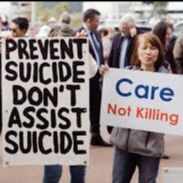This report was published by the Australian Care Alliance.
Euthanasia and assistance to suicide became legal in Queensland on 1 January 2023 under the Voluntary Assisted Dying Act 2021.
Numbers
245 deaths in six months represents about 1.31% of all deaths - higher than WA after one year and twice Victoria's rate after 4 years.
A second report,
covering 1 July 2023 - 30 June 2024 states that there were 793 deaths
under the Act - 532 deaths (67%) by “practitioner administration”, that
is euthanasia and 261 (33%) by “self-administration”, that is assisted
suicide.
This represents about 1.9% of all deaths in 2023/24 – a 45% increase on the rate for the first six months of operation.
A quarterly report covering 1 July 2024 - 30 September 2024 states that there were 241 deaths under the Act – representing 2.4% of all deaths in Queensland in that period, a further 26% increase on the rate for 2023-24.
One relevant factor in this higher rate compared to other Australian states could be that the eligibility criteria in Queensland include a prognosis that the condition is " expected to cause death within 12 months" whereas it is six months (except for neuro-degenerative conditions) in the other states.Practitioners
Registered nurses are allowed to administer the prescribed lethal substance to cause a person’s death. 172 registered nurses have done the training (compared to 187 medical practitioners and 22 nurse practitioners).
Of the 120 practitioners involved in 2023-24 as coordinating or consulting practitioners 47 of them were involved in 21 or more cases (that is on average at least one case every 17 days).20 nurses and nurse practitioners administered a lethal substance to a person in 2023-24, compared with 51 medical practitioners.
Of these 71 State trained professional killers, 28 are serial killers, having killed five or more people each in 2023-24.
Prognosis
Unlike other United States and Australian jurisdictions which limit assisted suicide (and, in Australian jurisdictions, euthanasia) to those with a prognosis of 6 months or less to expected death, the Queensland law allows access to those with a prognosis of expected death within 12 months.
This increases the likelihood of wrongful deaths from errors in prognosis.
Refusing treatment and symptom management
The Queensland Government explicitly states that those seeking euthanasia or assistance to suicide may meet the eligibility criteria of a terminal illness that is causing suffering by refusing medical treatment and symptom management.
This makes it clear that this regime is about facilitating the intentional ending of life and not about relieving unavoidable suffering at the end of life. Under these provisions people with otherwise non-terminal conditions such as a young person with insulin dependent diabetes could be euthanased.Timeframe
The law generally requires a nine-day period between a first and final request but this can be waived if two medical practitioners agree the person may die or lose decision-making capacity within that period.
In 2023-24, 275 people had the nine-day waiting period waived. This is 34.7 % of those who died under the Act.Where a person is assessed as likely to imminently losing decision-making capacity there must be a real doubt as to the person ‘s current decision-making capacity so this provision increases the likelihood of wrongful deaths from lack of decision-making capacity.
Government facilitation of suicide and euthanasia
The Queensland Government has established Queensland Voluntary Assisted Dying Support Service which will only provide information and assistance on suicide and euthanasia and will not provide any assistance or information on “any other health concerns, including your underlying conditions”.
The QVAD-Support service will directly link a person seeking to end their life with a medical practitioner willing to help them do so.
Any registered health practitioner who has a conscientious objection to facilitating the suicide of or euthanasing his or her patients must if asked by any person for such assistance or information give the person either the details of QVAD-Support Service or of a registered health practitioner willing to facilitate the person’s death.The Queensland voluntary assisted dying pharmacy is funded to supply the lethal poisons for suicide to individuals and for euthanasia to administering medical practitioners or nurses.
Reporting
Clause 8 of the Voluntary Assisted Dying Regulations 2022 requires the Voluntary Assisted dying Board to collect some minimal information that is then required to be published in an annual report to be provided by 30 September each year.
This includes basic demographic data (age, sex and region) of applicants and data on the underlying condition as well as the number of deaths from self-administration or practitioner administration of lethal poisons prescribed under the Act.
The time between first and final request is to be reported.
No data on referrals for additional assessments of eligibility or decision-making capacity is to be collected. Nor is there any provision for reporting on complications, the time between administration of the poison and loss of consciousness, or the time between administration of the poison and death.
Given the general complication rate of 7% or higher reported from other jurisdictions this is a concerning lack of transparency that undermines any future claim that there are no problems with the practice of assistance to suicide and euthanasia in Queensland. We will never know.
No safe space
The Act imposes on all hospitals, nursing homes and residential aged care facilities in Queensland the obligation to allow suicide and euthanasia by lethal poison on their premises for any permanent resident of the facility and for any other resident where a “deciding medical practitioner” determines transferring the person for this purpose is not “reasonable”.
This is a violation of the human rights of freedom of association, freedom of religion and freedom of conscience.
The sick and elderly should be able to choose to be treated or to live in a place where no-one is intentionally killed or helped to commit suicide.Lethal substances at large
One of the obvious risks of prescribing and supplying lethal substances to be kept in the community is that the lethal substance may be ingested by a person other than the person for whom it is prescribed.
The Queensland coroner investigated an incident, in which after a woman was prescribed lethal drugs under the Act but died in hospital before ingesting the drugs, her husband subsequently used the drugs to kill himself.
More articles about the Queensland experience with euthanasia.



















